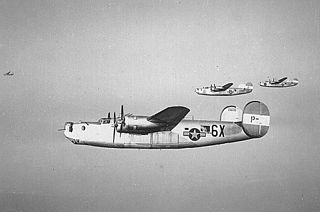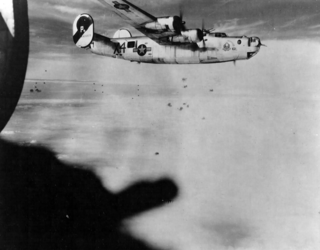
The 526th Intercontinental Ballistic Missile Systems Group is an inactive United States Air Force (USAF) unit. It was last located at Hill AFB, Utah, where it was inactivated in 2010. The group was first activated during World War II to conduct anti-submarine warfare in the Caribbean and off the Atlantic seaboard of Georgia and Florida. It was again active during the Cold War as an Atlas missile wing. Its final period of active service was as a systems and sustainment organization for USAF missile systems.

The 15th Special Operations Squadron is part of the 1st Special Operations Wing at Hurlburt Field, Florida. It operates Lockheed MC-130H Combat Talon II and Lockheed MC-130J Commando II aircraft in support of special operations.

The 25th Attack Group is an active United States Air Force unit, stationed at Shaw Air Force Base, South Carolina. It was activated in February 2018 as a Geographically Separate Unit to operate unmanned aerial vehicles and is assigned to the 432d Wing, which is located at Creech Air Force Base, Nevada. As of 2020, the group manages five MQ-9 Reaper attack squadrons, as well as the 25th Operations Support Squadron, which provides intelligence, weather, and administrative support.

The 820th Bombardment Squadron is a former Army Air Forces unit, inactivated on 4 January 1946. The squadron was first activated during World War II as the 521st Bombardment Squadron. The squadron was soon engaged in the antisubmarine campaign off the Atlantic coast of the United States as the 16th Antisubmarine Squadron.

The 1st Search Attack Group was a United States Army Air Forces unit that served during World War II. Its last assignment was with First Air Force. It was based at Langley Field, Virginia throughout its existence, and equipped with Boeing B-17 Flying Fortress, Douglas B-18 Bolo, and Consolidated B-24 Liberator aircraft. It was disbanded on 20 April 1944.

The 819th Bombardment Squadron is an inactive United States Air Force unit. Its last assignment was with the 30th Bombardment Group at Kahuku Army Air Field, Hawaii, where it was inactivated on 30 November 1945.

The 13th Air Expeditionary Group is a provisional United States Air Force unit.

The 378th Air Expeditionary Wing is a provisional United States Air Forces Central Command unit assigned to Air Combat Command. As a provisional unit, it may be activated or inactivated at any time.

The 2d Antisubmarine Squadron is an inactive United States Air Force unit. Its last assignment was with the 480th Antisubmarine Group, based at Clovis Army Airfield, New Mexico, and under the command of Col. Jack Roberts. On 13 November 1943, the 2d Antisubmarine Squadron was directed to relinquish their assignment to the U.S. Navy and to return to the United States with all personnel and equipment. For its role in the war, the group, which existed for only one year, was awarded a Distinguished Unit Citation, It was inactivated on 29 January 1944.

The 304th Bombardment Group is an inactive United States Army Air Forces (AAF) unit. Its last assignment was with the Army Air Forces Antisubmarine Command, based at Langley Field, Virginia. It was inactivated on 30 December 1942

The 14th Antisubmarine Squadron is a disbanded United States Army Air Forces unit. It was activated in 1942 as the 519th Bombardment Squadron and flew antisubmarine missions off the Atlantic coast until the Navy assumed its mission. It then moved to Texas, where it was disbanded in November 1943 and its personnel were used as cadres for heavy bomber groups.

The 855th Bombardment Squadron is an inactive United States Air Force unit. The squadron was first activated as the 522d Bombardment Squadron at Lantana Airport, Florida, in October 1942, when it assumed the personnel and equipment of a National Guard unit engaged in antisubmarine warfare over the Atlantic. The squadron continued antisubmarine patrols as the 17th Antisubmarine Squadron until the summer of 1943, when its mission was transferred to the Navy.

The 859th Special Operations Squadron is a reserve unit of the United States Air Force. It was first activated in October 1942 as the 517th Bombardment Squadron, when the Army Air Forces replaced National Guard observation units that had been mobilized and were performing antisubmarine patrols off the Atlantic coastline. A month after its activation, the squadron was redesignated the 12th Antisubmarine Squadron. In August 1943, the Army Air forces began turning the antisubmarine patrol mission over to the Navy and the squadron moved to California, where, as the 859th Bombardment Squadron, it formed the cadre for the 492d Bombardment Group.

The 851st Strategic Missile Squadron is an inactive United States Air Force unit. It was last assigned to the 456th Strategic Aerospace Wing, stationed at Beale Air Force Base, California. It was equipped with the HGM-25A Titan I intercontinental ballistic missile, with a mission of nuclear deterrence. It was the last Titan I squadron to achieve alert status on 1 February 1961. The squadron was inactivated as part of the phaseout of the Titan I on 25 March 1965.

The Second Bombardment Wing, abbreviated as 2nd Bombardment Wing of the United States Army Air Forces is a disbanded unit whose last assignment was with the Continental Air Forces, based at McChord Field, Washington. It was last active in November 1945.

The 19th Military Airlift Squadron is an inactive United States Air Force unit. It was last assigned to the 62d Military Airlift Wing, Military Airlift Command, stationed at McChord Air Force Base, Washington. It was inactivated on 22 December 1969.

The 6th Air Defense Missile Squadron was an air defense unit of the United States Air Force. It was assigned to the New York Air Defense Sector of Aerospace Defense Command, at Suffolk County Air Force Base, New York, where it was inactivated on 15 December 1964. The squadron had its headquarters at Suffolk County Air Force Base, while the firing batteries of the squadron were at the nearby Suffolk County Air Force Base Missile Annex.

The 24th Tactical Missile Squadron is an inactive United States Air Force unit. It was last active as the 74th Air Defense Missile Squadron assigned to the 23d Air Division of Aerospace Defense Command, stationed near Duluth Municipal Airport, Minnesota, where it was inactivated in 1972. The squadron's earliest predecessor was active early in World War II as an antisubmarine unit in the Caribbean and Europe until its mission was transferred to the United States Navy. During the Cold War it was a training unit for Matador cruise missiles. Its most recently active predecessor was an air defense missile squadron in the northern United States from 1960 to 1972.

The Army Air Forces Antisubmarine Command was formed in the fall of 1942 to establish a single command to control antisubmarine warfare (ASW) activities of the Army Air Forces (AAF). It was formed from the resources of I Bomber Command, which had been carrying out the antisubmarine mission in the Atlantic and Caribbean since the Attack on Pearl Harbor due to the lack of long range Naval aviation in that area.

The 361st Tactical Missile Squadron is an inactive United States Air Force unit. It was formed in 1985 by the consolidation of the 1st Antisubmarine Squadron and the 661st Bombardment Squadron. However, the squadron was ever active under its new title.



















